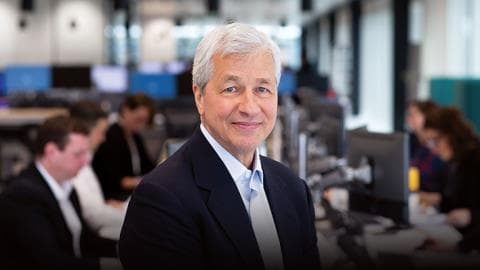JPMorgan Reportedly to Allow Clients to Access Crypto Funds
New policy is the latest in a string of moves by large banks to get clients exposure to growing space.

Jamie Dimon, CEO, JPMorgan Chase
- JPMorgan to allow all clients seeking advice to access these funds through its advisors, rather than just high-net-worth individuals
- Valkyrie Investments managing director says every platform the firm talks to is currently looking at how they can facilitate clients’ access to crypto
JPMorgan has reportedly become the first large US bank to allow its financial advisors to give wealth management clients access to cryptocurrency funds.
The bank told its advisors in a memo earlier this week that, as of July 19, they can buy and sell five crypto funds on behalf of a client, Business Insider reported.
The offerings include Osprey Funds’ Bitcoin Trust (OBTC), as well as four from Grayscale Investments: its Bitcoin Trust, Bitcoin Cash Trust, Ethereum Trust and the Grayscale Ethereum Classic Trust.
The move comes after Morgan Stanley confirmed in April that it was offering clients exposure to bitcoin through two external crypto funds. CNBC reported that the bank was allowing this access to individual investors with at least $2 million or investment firms with $5 million or more.
But JPMorgan’s new policy applies to all clients seeking advice, according to Business Insider, including self-directed users of its Chase trading app, clients whose assets are managed by JPMorgan Advisors and ultra-high-net-worth people serviced by the private bank. Despite being able to buy or sell these funds for clients who ask them to, advisors cannot recommend the products.
JPMorgan declined to comment further on the move.
John Key, a managing director at Valkyrie Investments who previously spent 24 years at UBS, said that though he wasn’t surprised by the news, it was an “ironic twist” given JPMorgan Chase CEO Jamie Dimon’s previous comments about bitcoin.
Dimon said at an investor conference in New York in 2017 that cryptocurrency “won’t end well,” calling it a fraud and adding that he would fire an employee for trading bitcoin.
Key noted that every single platform that Valkyrie has spoken to is currently assessing policy on how they can facilitate their clients investing in bitcoin or other cryptocurrencies. This includes all the major banks, he explained, as well as regional RIAs and independent platforms.
“I think it’s very significant and I think it just underscores the amount of momentum and interest there is in this asset class,” Key told Blockworks of JPMorgan’s move. “When an industry giant, the leader, takes a step forward like this, it definitely puts pressure on everybody else. I’m sure most people are pretty far along…but I think it could serve to perhaps accelerate some of that decision-making process.”
Key added that one can likely soon expect to see similar announcements from industry stalwarts like UBS and Merrill.
“I think at some point they’ll all have to have some sort of policy,” he said of giving clients access to crypto. “Some will be broader and more liberal about it. Some will be more restrictive given the bank and the specific clients and their type of business.”
The move comes after JPMorgan was reportedly preparing to offer an actively managed bitcoin fund to its private wealth clients, according to a CoinDesk report.
The National Cash Register recently partnered with digital asset management firm NYDIG to work on allowing 650 US-based banks and credit unions to offer crypto trading services and bitcoin purchases to about 24 million customers through mobile apps.
Industry watchers have told Blockworks that banks must innovate to compete, and those that have not yet announced ways to move into the crypto space are likely working on plans behind the scenes.
Bank of America was getting set to allow certain clients to trade bitcoin futures, CoinDesk reported last week.
Pure Digital, an interbank marketplace for cryptocurrency price discovery and exchange of wholesale risk, announced on Wednesday that BNY Mellon would join State Street and other banks to help it develop a platform for transacting digital assets. BNY Mellon, which has $45 trillion assets under custody, formed a digital assets unit in February.






